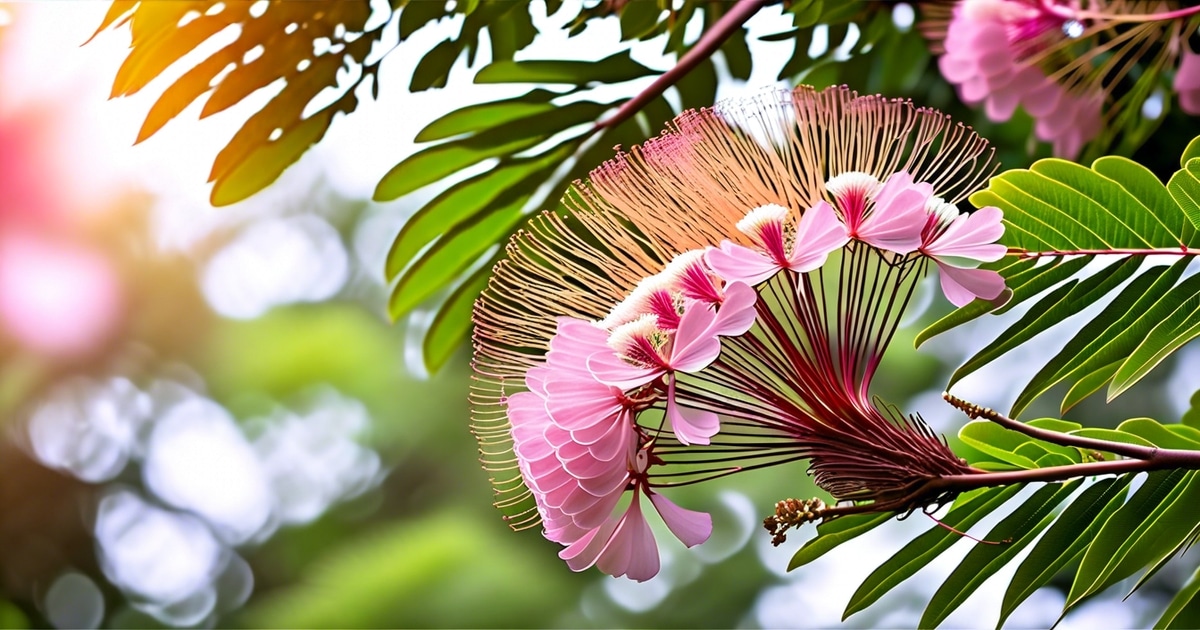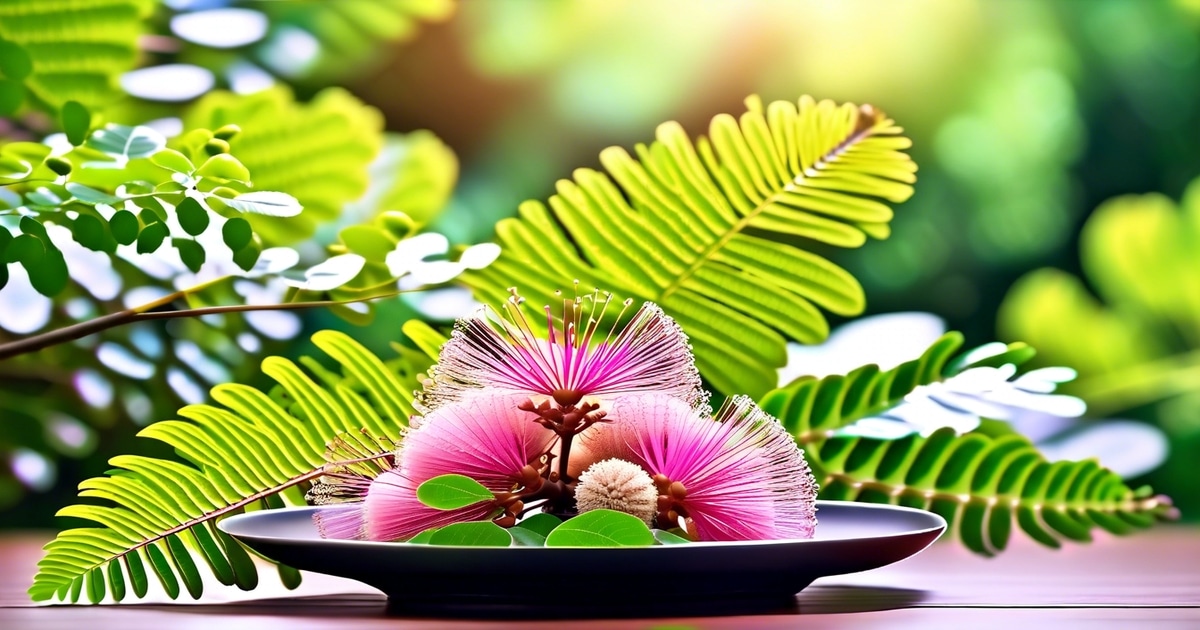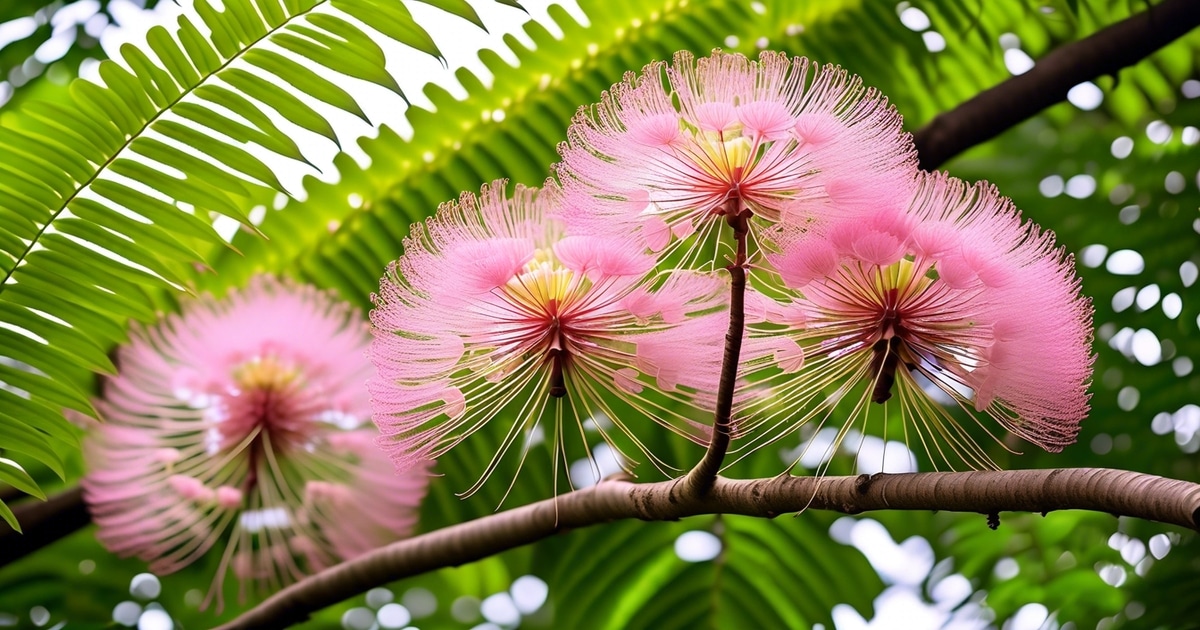Key Takeaways
- What is Albizia?
- Albizia, also known as the Mimosa tree, offers various health benefits due to its medicinal properties.
- Traditional uses of Albizia include treating anxiety, depression, and insomnia, showcasing its versatility in herbal medicine.
- Albizia’s health benefits range from reducing stress and improving mood to supporting respiratory health and boosting the immune system.
- Albizia’s herbal actions, supported by research, demonstrate its effectiveness in managing inflammation, allergies, and skin conditions.
- When using Albizia, be mindful of potential side effects and interactions, especially for pregnant women and individuals with certain medical conditions.
- To reap the benefits of Albizia and other herbs, follow recommended preparation methods and dosage guidelines to ensure safe and effective use.
Did you know that the Albizia tree, known for its stem bark, has over 150 species worldwide? From its use in traditional medicine to its environmental benefits, Albizia trees play a significant role in ecosystems globally. Often referred to as the “silk tree” due to its delicate pink flowers, this plant offers more than just beauty. Let’s dive into what makes Albizia trees unique and why it deserves our attention.
Albizia Overview and Taxonomy
Diversity of Albizia
Albizia, a genus of flowering trees in the legume family, boasts over 150 species worldwide. These trees are recognized for their distinctive feathery and fern-like leaves. The vast diversity within the genus showcases various characteristics that make each species unique.
- Diverse range of over 150 species globally
- Unique features such as feathery leaves set them apart
Importance of Albizia Trees
Albizia trees play crucial roles in different ecosystems due to their versatility and beneficial properties, including bioactive constituents. For instance, some trees are known for their sturdy wood used in furniture making or construction. Certain trees have medicinal uses attributed to components found in their stem bark.
- Versatile nature with multiple ecosystem roles
- Valuable properties like sturdy wood and medicinal components
Traditional Uses of Albizia
Anxiety and Depression
Albizia, a versatile plant, has been utilized in traditional medicine as an antidepressant to address anxiety and depression. The bark and leaves of trees are often brewed into teas or tinctures for their calming effects. People seeking natural remedies have turned to Albizia trees for their potential mood-boosting and antidepressant properties.
- Pros:
- Natural remedy
- Calming effects
Skin Conditions
The bark of the Albizia tree has been employed as a treatment for various skin issues, such as eczema and rashes. When applied topically, it is believed to soothe irritation and promote healing. Many individuals have found relief from these common dermatological problems by treating Albizia-based preparations.
- Pros:
- Soothes irritation
- Promotes healing
Respiratory Issues
In numerous cultures, the delicate flowers of the Albizia tree have been historically used to alleviate coughs and other respiratory problems. Whether consumed in tea or incorporated into herbal remedies, these blossoms are valued for their potential respiratory health benefits.
- Pros:
- Alleviates coughs
- Supports respiratory health
Health Benefits of Albizia

Antioxidant Properties
Albizia trees, also known as the Mimosa tree, are rich in antioxidants. These compounds help protect our bodies from oxidative stress by neutralizing harmful free radicals. Consuming Albizia trees can boost your body’s defense against various diseases and support overall health.
Consuming foods or supplements high in antioxidants like Albizia trees may lower the risk of chronic conditions such as heart disease and cancer. The antioxidants present in Albizia trees can help reduce inflammation, promoting better immune function and overall well-being.
Anti-Inflammatory Effects
Studies suggest that Albizia trees possess anti-inflammatory properties that could benefit individuals suffering from inflammatory conditions like arthritis. Incorporating Albizia trees into your diet or wellness routine, you may experience reduced inflammation and improved joint health.
Albizia’s anti-inflammatory action may alleviate symptoms associated with inflammatory disorders, enhancing mobility and reducing pain levels. This natural remedy offers a holistic approach to managing inflammation without harsh side effects often linked to conventional medications.
Herbal Actions and Research on Albizia
Adaptogenic Properties
Albizia, an adaptogen herb used in herbal medicine, helps the body manage stress levels effectively. It helps balance the body’s response to stressors, promoting overall well-being.
Studies indicate that Albizia extracts possess anxiolytic effects, assisting in reducing anxiety and enhancing mood. By incorporating Albizia into herbal formulae, individuals may experience a sense of calmness and relaxation.
- Acts as an adaptogen
- Reduces anxiety
- Enhances mood
Antimicrobial and Anticancer Activity
Research has revealed that Albizia contains bioactive constituents like saponins and flavonoids with antimicrobial properties against specific bacteria and fungi. These findings suggest its potential use in combating infections naturally.
Moreover, investigations have explored the tumor-saponin present in Albizia for its potential anticancer properties. Preliminary studies show promising results regarding the herb’s ability to inhibit cancer cell growth.
- Exhibits antimicrobial activity
- Shows potential anticancer properties
Side Effects and Safety Interactions of Albizia
Allergic Reactions
Some individuals may experience allergic reactions to Albizia. Symptoms can include skin rashes, itching, or swelling. If this occurs, it’s essential to stop using Albizia immediately.
Pregnancy and Medication Interactions
Pregnant or breastfeeding women should consult a healthcare professional before using Albizia. Limited information is available on its safety during pregnancy or while nursing, and there is limited data on potential interactions between Albizia and antidepressant medications.
Preparation and Dosage Recommendations

Albizia Plant Parts
Albizia can be used as an antidepressant in various preparations, such as teas, tinctures, and capsules. Different parts of the plant offer unique benefits. For instance, albizia bark is often used for its calming properties in teas or tinctures to promote relaxation.
Albizia flowers are known for their mood-enhancing effects and are commonly used in supplements to support emotional well-being. These different parts provide a range of options when considering incorporating Albizia into your wellness routine.
Dosage Guidance
Dosage recommendations for Albizia supplements vary based on the product type and intended use. Before starting any new supplement regimen, it is crucial to consult with a qualified herbalist or healthcare provider. They can provide personalized guidance tailored to your specific needs and health conditions.
Understanding the appropriate dosage ensures you experience its full benefits without adverse effects. Whether you opt for a tea, tincture, or capsule form of Albizia to alleviate depression, following recommended dosages is key.
Sustainability and Regulation of Albizia Worldwide
Sustainable Cultivation Practices
Albizia species are valuable for their timber, but ensuring sustainable practices to protect natural habitats is crucial. By implementing sustainable cultivation methods, we can prevent the depletion of forests and safeguard biodiversity. For instance, selective harvesting techniques can help maintain healthy Albizia populations while preserving ecosystems.
To regulate the trade and use of Albizia globally, some countries have established regulations to conserve these trees and prevent overharvesting. This ensures that Albizia species are not exploited unsustainably, protecting them for future generations. Organizations like CITES oversee international trade to enforce regulations that promote conservation efforts.
Role of International Organizations
The Convention on International Trade in Endangered Species of Wild Fauna and Flora (CITES) is pivotal in monitoring and regulating the international trade of various plant species, including Albizia. Through collaboration with member countries, CITES aims to combat illegal trafficking and unsustainable harvesting practices that threaten plant species’ survival worldwide.
- Sustainable cultivation practices preserve natural habitats
- Regulations prevent overharvesting and exploitation
- CITES monitors international trade to ensure conservation efforts
Closing Thoughts
You’ve delved into the world of Albizia, uncovering its taxonomy, traditional uses, health benefits, herbal actions, and more. The journey through this article has shed light on the diverse facets of Albizia, showcasing its potential as a valuable herb in various aspects of health and wellness. Consider the preparation and dosage recommendations carefully if you incorporate Albizia into your routine.
As you navigate the realm of herbal remedies, don’t hesitate to explore further and consult with experts for personalized advice. Your curiosity and willingness to learn about herbs like Albizia contribute to your well-being. Embrace the knowledge gained here and let it guide you towards informed decisions for a healthier lifestyle.
Frequently Asked Questions
What is Albizia?
Albizia, also known as silk tree or mimosa, is a genus of flowering plants belonging to the legume family. It’s commonly used in traditional medicine for its various health benefits.
How can Albizia be used traditionally?
Albizia has been traditionally used to support relaxation, reduce stress and anxiety, promote sleep, and enhance mood. It’s also utilized for its anti-inflammatory and antioxidant properties.
What are the health benefits of Albizia?
Albizia is believed to have numerous health benefits, such as supporting respiratory health, improving skin conditions, boosting immunity, and aiding in digestive issues due to its anti-inflammatory and adaptogenic properties.
Are there any side effects or safety concerns associated with Albizia?
While generally considered safe when taken in recommended doses, some individuals may experience mild side effects like gastrointestinal discomfort. Pregnant or breastfeeding women should consult a healthcare provider before using it.
How should Albizia be prepared, and what are the dosage recommendations?
Albizia can be consumed as a tea infusion using dried flowers or bark. The typical dosage ranges from 3 to 6 grams daily, depending on the form of preparation (tea, tincture). Consult an herbalist or healthcare professional for personalized recommendations based on individual needs.
Is Albizia sustainable, and how is it regulated worldwide?
The sustainability of Albizia cultivation varies across regions. Some countries have regulations in place to ensure responsible harvesting practices. However, due to increasing demand and potential overharvesting risks, efforts are being made globally to promote sustainable sourcing practices for Albizia products.

